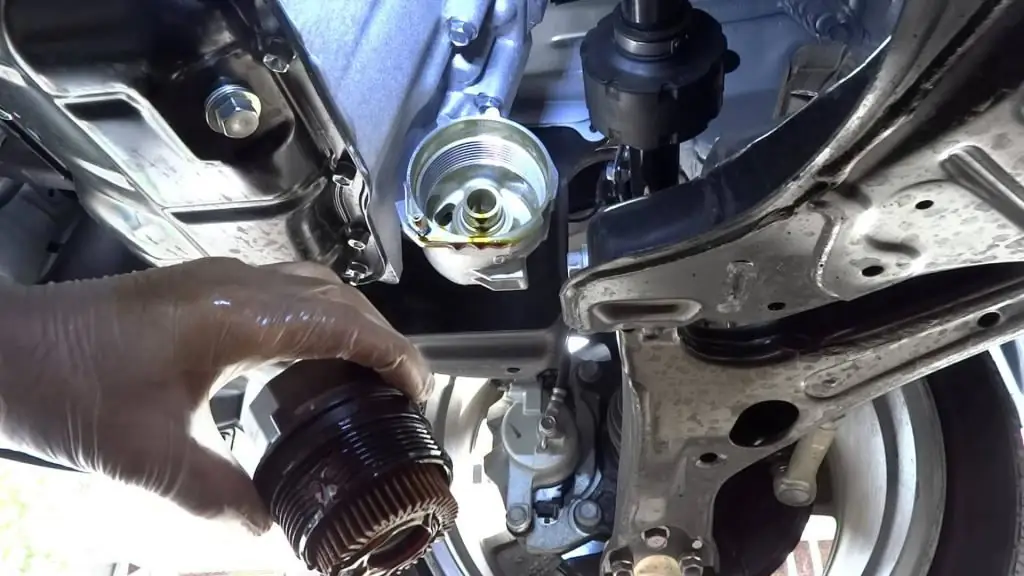2026 Author: Erin Ralphs | ralphs@carsalmanac.com. Last modified: 2025-01-22 21:14:12
When the season of motorcycles is about to come, the owners of motorcycles are already returning to their iron horses, sorting them out, and again thinking what kind of oil to pour into a motorcycle, how to do it right and whether the car oil is suitable?
Car and motorcycle oil
When switching from a motorcycle to a car and vice versa, many people think that oil should be used differently in one and the other technique, since it works differently in it.
Three oils are used in a car:
- for engine;
- for gearbox;
- for rear axle.
In modern motorcycles, on almost all models, all functions lie in one single oil, since the engine, gearbox, and clutch are located in one block.
They say that in cars, oil serves only as a protective barrier, preventing various mechanical influences. And in motorcycles, in addition, it must cool the motor and prevent thermal failure, since due to the huge speed, a large amount of energy is produced, causing extreme heat.

Motorcycle oil
To deal with it, oilmust be adapted to work in extreme conditions. Viscosity must be maintained here, even if the temperature changes sharply and strongly. The oil should be light on the one hand to flow through narrow openings, and on the other hand viscous to coat fast moving parts.
Viscosity refers to the ability to resist shearing and flow. The fluid will be less fluid and more resistant to shearing when the viscosity is high. And vice versa. With a lower viscosity, the liquid becomes more fluid and less resistant to shearing.
When an engine is running, oily parts try to displace oil due to friction against each other. But if the viscosity of the oil is good enough, then the liquid passes through the holes slowly, and the contacting elements have the opportunity to recover.
The instructions for the motorcycle indicate the types of oils that are recommended for the engine.
All season

One of the most popular among them is SAE 10w40. Oil refers to all-weather.
10w means the viscosity at -40 degrees Celsius.
40 also indicates viscosity, but already at a temperature of 100 degrees Celsius.
This motorcycle oil exhibits a smooth flow at low temperatures, but has its standard appearance at high temperatures. Its idea is that during a cold start it has a low density, and after warming up it retains its viscous properties. Before the advent of this type, the engine was always in a state ofincreased wear, so usually one oil was poured for the winter, and the other for the summer.
During operation, you need to remember that motorcycle oil manifests itself non-linearly as it warms up. Usually manufacturers are silent about this. Meanwhile, this is the second most important parameter that you need to pay attention to after viscosity.
General tips for choosing oil
Given the owner's manual of the vehicle, motorcycle engine oil should be chosen first with common sense. For example, if normal driving is carried out at a temperature of +35 degrees Celsius, then a denser 15w15 oil will do. So the engine will be better protected. But in the spring, 10w40 (as less dense) will be just a good option.

If the viscosity level is low, and the engine is very hot at high temperatures, the oil is cut through by engine elements especially easily, and therefore it is subject to rapid wear. In this case, it is necessary to fill in oil at a level higher than recommended.
Because engine power doesn't change much when warmed up, many riders use even higher viscosity motorcycle oil when operating at high temperatures to save the unit and gearbox.
Maybe it's a car after all?
The first thing that catches your eye when comparing car oil and motorcycle oil is the price. Motor oil is much more expensive than car oil.

According to manufacturers and manyvehicle owners, motor oils spoil motorcycle units, and the clutch disappears.
But there is another opinion, according to which some conditionally negative impact does happen. But this only applies to the clutch. And the whole negative boils down to the fact that modern oils have very strong cleaning properties that simply lead to clutch slippage. But you can also use less modern oil!
Classification
Oils have a specification. For example, according to the American API classification, as new products appeared, their indices changed: SA, SB, SC, SD, and so on in their letter for each generation. Modern automotive oils have already reached SN indices, but motor oils have stopped at SH.
If you look at other classifications, you will find an amazing thing: motorcycle oil is simply no different from car oil!
But why then do you have to overpay? Maybe it's all about the psychology of buyers and the high costs of manufacturers for smaller packages? Worth considering.
Recommended:
Changing the oil in a Mercedes. Types of oil, why it needs to be changed and the main task of engine oil

A car is a modern vehicle that needs to be monitored every day. A Mercedes car is no exception. Such a machine should always be in order. Changing the oil in a Mercedes is an important procedure for a vehicle. In this article we will talk about how important it is to carry out this procedure, what types and types of oil are
Oil change in Toyota: types and choice of oil, specifications, dosage, do-it-yourself oil change instructions

The reliability of your car depends on quality maintenance. To avoid additional repair costs, it is recommended to use engine oil in a timely and correct manner. The operation of any car implies a number of regulatory requirements. Toyota oil change must be carried out according to the instruction manual. It is recommended to perform the procedure after every 10,000-15,000 km of the vehicle run
Oil change VAZ 2107: types of oil, specifications, dosage, instructions for changing the oil yourself

The article contains detailed instructions for changing the oil in VAZ 2107 engines. In the text you can find information about when a change is required, what kind of oil happens, the tools necessary for the "procedure" and a complete description of the process of changing the oil in a car
Changing the oil in the Chevrolet Niva engine: the choice of oil, the frequency and timing of oil changes, tips from car owners

The car's powertrain needs regular maintenance. The engine is the heart of any car, and its service life depends on how carefully the driver treats it. In this article we will talk about how to change the oil in a Chevrolet Niva engine. Despite the fact that every motorist can do this, there are some nuances that you must first familiarize yourself with
How to check the oil level in automatic transmission? Oil for automatic transmission. Oil dipstick

In this paper, the question is considered: "How to check the oil level in automatic transmission?" And also directly with the help of which the oil level in the automatic transmission is checked. Tips are given on the selection of oil, instructions are given for changing it yourself

